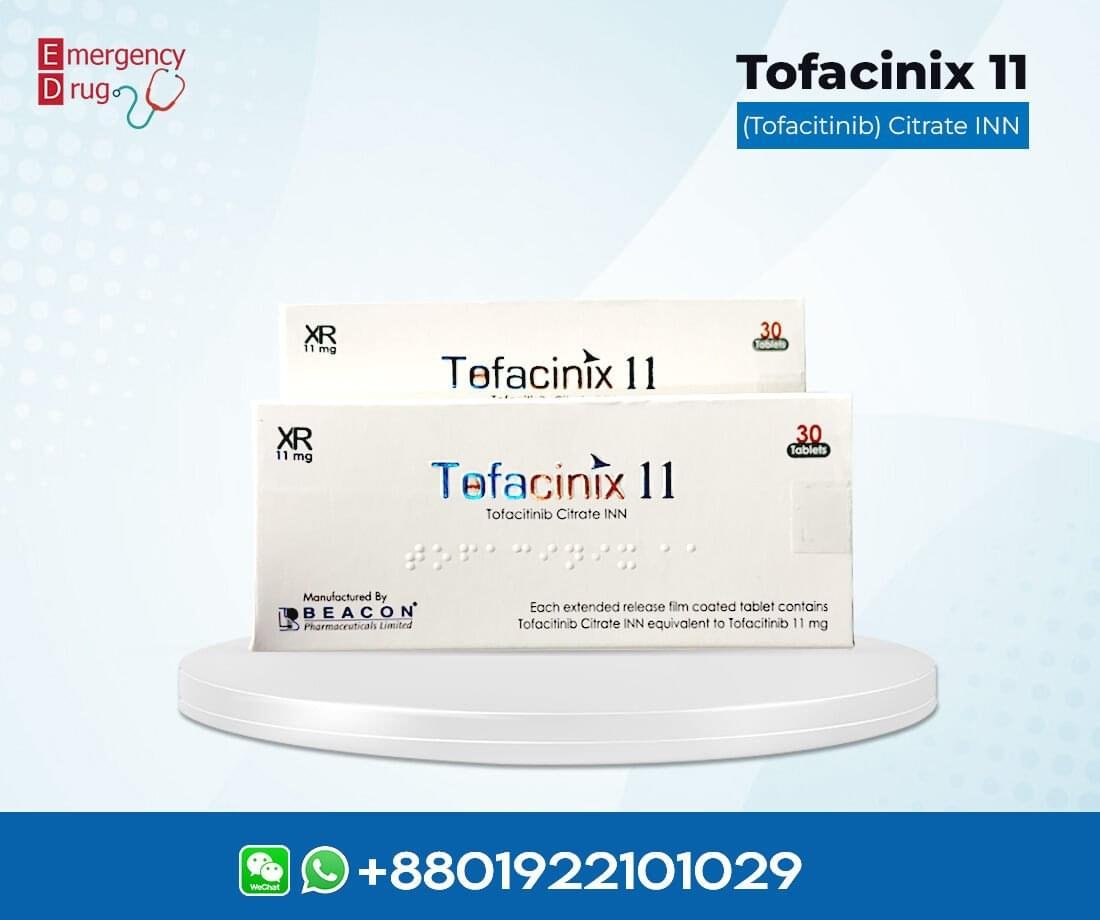Description
Tofacinix 11 mg tablet is a specific dosage strength of the medication Tofacitinib. Tofacitinib is an oral Janus kinase (JAK) inhibitor used to treat various autoimmune conditions, including rheumatoid arthritis, psoriatic arthritis, ulcerative colitis, and ankylosing spondylitis, among others
Product Features of Tab Tofacinix 11 mg:
|
Product Name |
Tofacinix |
|---|---|
| Generic Name | Tofacitinib |
| Manufacturer | Beacon Pharma Ltd. |
| Indication | Rheumatoid arthritis |
| Formulation | Tablet |
| Strength | 11 mg |
| Quantity | 30 Tablets |
| Storage | Room temperature |
| Registrations | Export Only |
| Retail Exporter | EmergencyDrug.com |
| Tofacinix 11 mg Price | $90.00 |
Tofacinix Dosage
The dosage of Tofacinix 11 mg can vary depending on the specific autoimmune condition being treated and the individual patient’s medical history. It is of utmost importance to adhere to the dosage and instructions provided by your healthcare provider. Typically, Tofacitinib tablet taken once daily.
Rheumatoid Arthritis
Doctors may prescribe a higher dose, such as 11 mg once daily, to some patients depending on the severity of their condition and their response to treatment.
Psoriatic Arthritis
As with rheumatoid arthritis, some individuals may be prescribed Tofacinix 11 mg once daily.
Ulcerative Colitis
The recommended starting dose for adults is often tofacitinib 10 mg taken orally twice daily for induction for 8 weeks and 11 mg given once daily for maintenance.
Warnings And Precautions
Patients undergoing treatment with Tofacinix 11 mg have reported serious and sometimes life-threatening infections caused by various pathogens, including bacteria, mycobacteria, invasive fungi, viruses, and other opportunistic microorganisms. Among the most frequently observed serious infections associated with Tofacitinib use are pneumonia, cellulitis, herpes zoster (shingles), urinary tract infections, diverticulitis, and appendicitis.
In addition to these common infections, Tofacinix 11 mg has also linked patients to opportunistic infections such as tuberculosis and other mycobacterial infections, cryptococcosis, histoplasmosis, esophageal candidiasis, pneumocystosis, multidermatomal herpes zoster, cytomegalovirus infections, BK virus infection, and listeriosis.
It’s worth noting that some patients have developed disseminated infections rather than localized ones. This has occurred more frequently in individuals who were also taking other immunomodulating drugs like methotrexate or corticosteroids alongside Tofacinix.
Healthcare providers should exercise caution when considering the use of Tofacitinib in patients with ulcerative colitis (UC). It is advisable to avoid Tofacinix in individuals with active and serious infections, including those that are localized. Before initiating Tofacitinib treatment, healthcare providers should carefully evaluate the potential risks and benefits, especially in patients who have:
- Chronic or recurrent infections.
- Been exposed to tuberculosis.
- Suffered from serious or opportunistic infections.
- Resided in or traveled to areas where tuberculosis or endemic fungal infections are prevalent.
- Underlying medical conditions that may make them more susceptible to infections.
Always follow your doctor’s instructions and attend regular check-ups while closely monitor for the development of signs and symptoms of infection during and after treatment with this tablet.
Buy Tofacinix 11MG Tablet Now @ $90.00
Side Effects of Tofacinix
Most common side effects are:
- Upper respiratory tract infections
- Headache
- High blood pressure (hypertension)
- Increased levels of liver enzymes
- Nausea
- Diarrhea
- Changes in blood cell counts
- Elevated levels of cholesterol and triglycerides
- Skin rash
- Elevated creatinine levels (a marker of kidney function)
Pregnancy and Lactation
Pregnancy Category C. There are no adequate and well-controlled studies in pregnant women. Tofacinix uses during pregnancy only if the potential benefit justifies the potential risk to the fetus. It is not known whether this medicine is excreted in human milk. Caution exercised when this product administered to a nursing woman.
Tofacitinib Drug Interactions
With medicine: Tofacitinib exposure increase when Tofacitinib is co-administered with potent inhibitors of cytochrome P450 (CYP) 3A4 (e.g., ketoconazole) and CYP2C19 (e.g., fluconazole). Use of Tofacitinib in combination with biologic DMARDs or potent immune suppressants such as azathioprine and cyclosporine not recommend.
With food and others: Avoid taking Tofacitinib with grapefruit juice and to avoid grapefruit juice completely during Tofacitinib treatment.
Overdose
There is no specific antidote for overdose with Tofacitinix 11 mg . In case of an overdose, it recommends that the patient monitor for signs and symptoms of adverse reactions.
Storage Condition
Store below 25°C. Do not remove desiccant. Dispense in the original container. Keep it out of the reach and sight of children.
How Supplied
This tablet: Each HDPE contain 30 tablets, a silica gel desiccant, and a polyester coil with a child-resistant closure.
Buy Tofacinix 11 MG Tablet Now
Buying Tofacinix 11 mg Online
Tofacinix 11 mg is available through certified exporters such as EmergencyDrug.com. Each batch is certified by Everest Pharmaceuticals, maintaining international GMP standards.
Why Buy from EmergencyDrug?
- Secure & verified sourcing
- International & fast delivery
- Competitive pricing available
- Customer Care Service
Conclusion
Tofacinix 11 mg represents a powerful evolution in autoimmune treatment—combining once-daily convenience with proven efficacy across RA, PsA, AS, and UC. With a favorable safety profile, cost advantage, and oral administration, it’s fast becoming the go-to alternative for patients who’ve outgrown traditional therapies.
Whether you’re exploring options beyond methotrexate or looking for relief from UC flares, Tofacinix offers renewed hope—with the science to back it up.
The country where our services are provided
Delivering worldwide including United State (USA), United Kingdom (UK), Saudi Arabia, Dubai, Kuwait, Qatar, Philippines, Nepal, Malaysia, Indonesia, Thailand, Poland, Peru, South Korea, New Zealand, Netherlands, Georgia, France, Egypt, Australia, Germany, Canada, Uzbekistan, Lebanon, Mexico, Singapore, Vietnam, etc.
Emergency Drug is the best website for medicine order and one of the top mail order pharmacies in Bangladesh that exports medicines w/without prescriptions in abroad. Visit to buy our other brand of Tofacitinib.
For more arthritis medicine, visit our SHOP
Why Buy from Us :
- 100% genuine products
- Licensed exporter
- Discreet packaging
- Customer support

Reviews
There are no reviews yet.